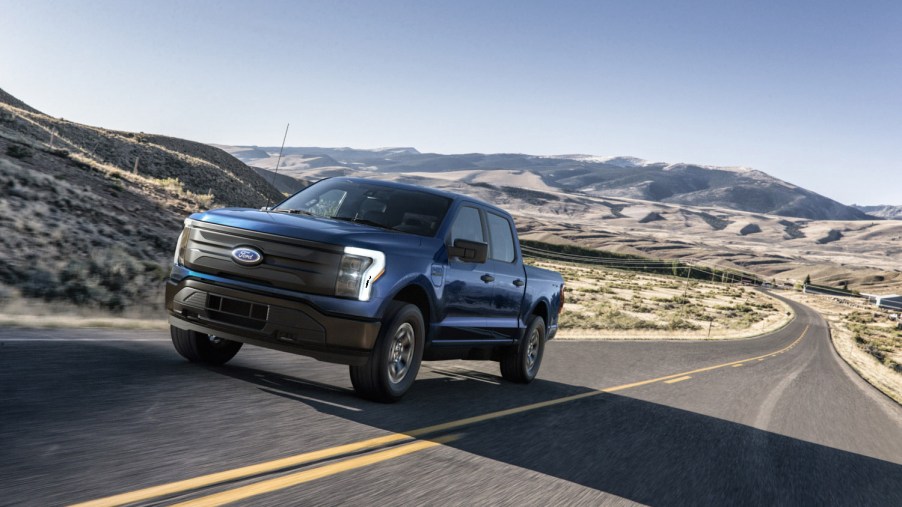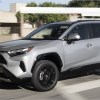
Ford Is Spending $850M On the 2022 Ford F-150 Lightning Electric Truck, Here’s Why
In an exclusive Reuters report, sources revealed that Ford has doubled its production target for the 2022 Ford F-150 Lightning EV truck. Ford has adjusted its production targets because of the strong demand for the full-sized electric pickup truck. And, according to several people and suppliers familiar with the Blue Oval’s plans, the automaker also plans to spend an additional $850 million to meet its production targets ahead of the truck’s showroom debut in 2022.
The Ford F-150 Lightning is an electric truck for the masses

The Ford F-150 has been America’s bestselling truck for decades. However, it’s the 2022 Ford F-150 Lightning that’s here to change the truck scene. In fact, the all-new Lightning is the brand’s electrified version of the Ford F-150.
The Lightning marks the first-ever all-electric F-Series truck too. The new electric truck starts at $39,974 and comes equipped with a standard range battery and dual motor power 4×4. According to Ford, it’s targeting 426-horsepower and an EPA-estimated 230 miles of range with the standard Lightning model.
An extended-range version will also be available. That version is targeting 563-horsepower and an EPA-estimated range of 300 miles. The long-range version is, however, more expensive and starts at $49,974. As for why Ford is spending $850 million on the all-new Ford F-150 Lightning electric truck? Let’s find out.
Why Ford is spending $850M on the 2022 Ford F-150 Lightning EV truck
According to insider sources, Ford is “pleasantly surprised by the demand for the Lightning.” And while the automaker anticipated initially annual production of more than 40,000 Ford F-150 Lightning EV trucks, the brand has since adjusted its production plans.
In fact, according to Reuters’ sources, Ford’s new plan includes building out 15,000 F-150 Lightning models in 2022, 55,000 in 2023, and 80,000 in 2024. Ford will then reportedly target 160,000 vehicles in 2025 when the second-generation Lightning makes its showroom debut. According to Reuters source’s, the automaker plans on spending an additional $850 million to ensure it meets its production targets amid solid demand for the electric truck.
“We are excited with customer demand for the F-150 Lightning and already have 120,000 customer reservations, and we will continue to look for ways to break constraints and meet customer demand,” The automaker said in a statement provided to Reuters.
Ford is also spending over $22 billion on electric vehicles

When it comes to electric vehicles, Ford is a big spender. In fact, in May, the brand revealed its EV strategy, including spending over $22 billion on EVs. Ford’s EV strategy focuses on leveraging some of its most prominent nameplates, including the electric F-150, the Ford E-Transit van, and the Mustang Mach-E. Ford says it also looks forward to offering zero-emissions versions of many of its most popular Ford models.
Ford isn’t just investing in new electric vehicle models either. It’s also investing in battery cell technology. In fact, the automaker recently announced the establishment of its global battery center in southeast Michigan, where it will develop new battery cell manufacturing techniques. The brand also recently increased its investment in Solid Power, an industry-leading producer of batteries for electric vehicles.
“A key part of Ford’s goal to drive the adoption of electric vehicles is to target the large market for fully electric commercial vans and pickups. Ford is planning to bring the benefits of electric vehicles to these customers with an accessible price point, improved productivity, and lower cost of ownership.”
Ford
Are electric vehicles here to change the game?
While it’s certainly exciting to see Ford up its production targets for the Ford F-150 Lightning electric truck, Ford isn’t the only automaker with plans to introduce electric pickups to its lineup. Both General Motors and Tesla have plans to sell electric pickup trucks. Start-ups like Lordstown Motors, Canoo, and Rivian are also introducing their electric trucks to the market.



